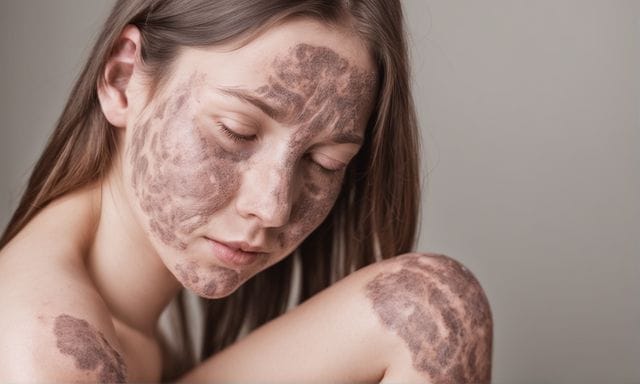The skin, our body’s largest organ, protects against the world’s elements. It’s also a canvas that can display a wide range of issues, from the common to the rare, the manageable to the severe. In this comprehensive guide, we’ll embark on a journey to understand diverse skin conditions, diseases, and disorders, empowering you with the knowledge to navigate this intricate terrain effectively.

Common Skin Conditions
Acne: The Battle of Adolescence and Beyond
*Acne*, the dreaded term that resonates with millions, often emerges during adolescence. But this common skin condition doesn’t discriminate by age. It’s characterized by pimples, blackheads, and whiteheads, brought about by clogged pores and excess oil production. While it’s not life-threatening, its psychological impact can be profound.
Eczema (Dermatitis): The Persistent Itch
Eczema, or dermatitis, is a skin problem that causes persistent itching and lasts a long time. It frequently debits in childhood but can extend its stay into adulthood. This inflammatory skin condition can result in redness, scaly patches, and a constant battle against the urge to scratch.
Psoriasis: When Skin Cells Multiply Uncontrollably
*Psoriasis* is an autoimmune skin disease where skin cells multiply at an accelerated pace, causing thick, scaly patches. The struggle against this condition can be lifelong, but understanding it is the first step toward effective management.
Rosacea: The Crimson Affliction
Rosacea* is known for its telltale redness and visible blood vessels on the face. Bumps and pimples often accompany it. While not life-threatening, it can significantly impact one’s self-esteem and quality of life.
Skin Disorders
Vitiligo: The Art of Skin Color Transformation
The loss of skin colour in patches is a characteristic of Vitiligo*, a skin disorder. It’s thought to be an autoimmune condition that affects melanocytes, the cells responsible for skin pigmentation.
Pemphigus: Battling Skin Blisters
*Pemphigus* is a rare autoimmune skin disorder characterized by blistering and sores on the skin and mucous membranes. It can be life-threatening if left untreated.
Ichthyosis: The Scaly Skin Enigma
*Ichthyosis* refers to genetic skin disorders manifesting as dry, scaly skin resembling fish scales. Understanding the genetic factors at play is critical to managing this condition.
Epidermolysis Bullosa: Fragility Defined
The skin of people with epidermolysis bullosa, a genetic disorder, is easily damaged and can result in blistering and skin loss from even minor injuries. Specialized care is necessary to manage this condition effectively.
Skin Problems: Itching and Dry Skin
Itching and dry skin are common problems affecting individuals of all skin colours. Skin issues can come from different causes, like contact dermatitis or chronic skin conditions. The skin colour may show these problems differently, causing changes in skin colour. Getting guidance from a dermatologist or the American Academy of Dermatology is essential for proper skin care. Skin cancer called basal cell carcinoma typically doesn’t result in itchy or dry skin. However, it’s crucial to be aware of skin texture changes, such as thickened or scaly skin. If you see signs of a more severe condition, seek medical help immediately. Keeping skin healthy requires early detection and proper care for common skin problems. It’s important to stay alert and address issues as soon as they arise.
The Unrelenting Itch: Scratching Beneath the Surface
Various skin conditions, ranging from allergies to infections, can manifest through the symptoms of itching. While temporarily alleviating the sensation, scratching can exacerbate the underlying issues, highlighting the importance of identifying and treating the root cause.
Dry Skin: Nourishing the Deserted Dermis
*Dry skin*, or xerosis, is a common problem that affects people of all ages. It can lead to flaking, scaling, and discomfort. Proper skincare and lifestyle adjustments can alleviate this condition.
Understanding the Causes
The causes of skin conditions, diseases, and disorders are as diverse as the conditions themselves. Genetics, environmental triggers, hormonal changes, and even certain health conditions can significantly affect their development.
Seeking Treatment and Care
Treatment for skin conditions varies depending on their type and severity. Consulting a dermatologist, a medical professional specializing in skin health is often the first step to accurate diagnosis and tailored treatment plans.
Conclusion
The landscape of common skin conditions, diseases, and disorders is multifaceted and ever-evolving. While some may be temporary nuisances, others require ongoing management and care. You can confidently navigate this terrain with knowledge about the causes, symptoms, and available treatments. Remember, your skin is your body’s canvas; understanding and caring for it is a lifelong journey toward optimal health and well-being. If you suspect skin issues, don’t hesitate to seek guidance from a healthcare professional, as early intervention can make a difference.
FAQs
Which skin disease is not curable?
One skin disease not curable but can be managed with proper care and treatment is psoriasis. Thick, scaly patches on the skin are formed due to psoriasis, a medical condition. The affected areas can appear on any body part, though they are most commonly seen on the elbows, knees, scalp, and lower back. Overactivity of the immune system is responsible for this condition, which may aggravate hormonal changes, stress, and certain medications. If left untreated, psoriasis symptoms can become more severe and cause discomfort, even affecting the hands and feet. Although psoriasis cannot be cured, various treatments can aid in symptom management and enhance the overall quality of life. Psoriasis is a prevalent skin condition that causes inflammation. It can’t be cured but can be managed with the right treatment plan. Working with a dermatologist or healthcare provider is essential to develop a personalized treatment plan, including creams, phototherapy, oral medications, and biologic drugs. It is possible to manage the condition by implementing a healthy lifestyle and adhering to appropriate skin care practices. These changes can effectively improve the situation. To do this, avoid triggers and maintain a healthy diet. If you suspect you have psoriasis or experience severe symptoms, you should see your doctor for an accurate diagnosis and appropriate treatment.

